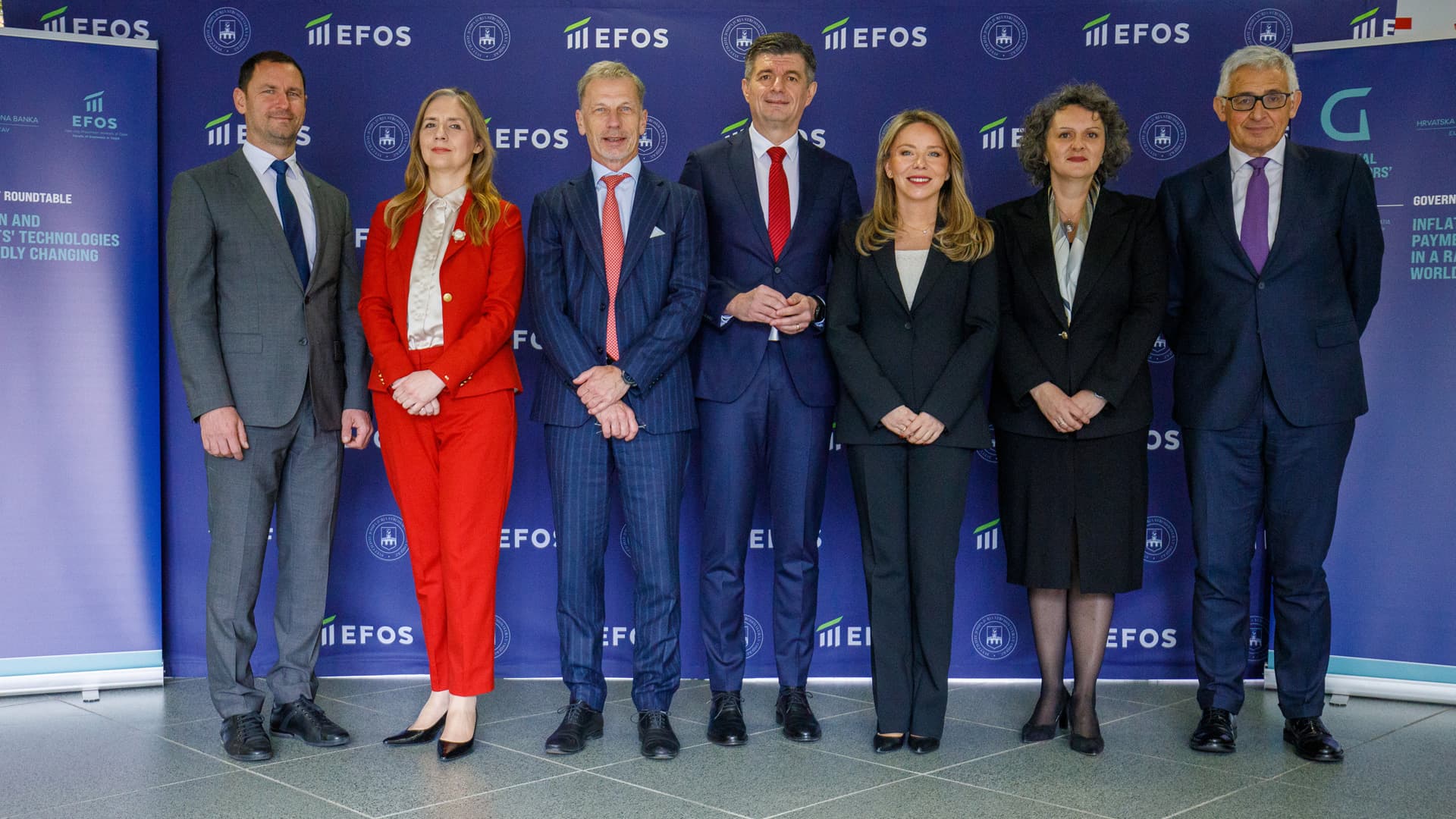
The Regional Governors’ Meeting, organised in Osijek today by the Croatian National Bank in cooperation with the Faculty of Economics and Business in Osijek, included a governors’ panel discussion "Inflation and Payment Technologies in a Rapidly Changing World".
Before the panel, the guests were greeted by Boris Crnković, Dean of the Faculty of Economics and Business in Osijek, and the keynote address "Enhancing Cross-border Payments in Europe and Beyond” was given by Piero Cipollone, Member of the Executive Board of the European Central Bank.
The panelists, including Boris Vujčić, Governor of the Croatian National Bank, Anita Angelovska Bezhoska, Governor of the National Bank of the Republic of North Macedonia, Primož Dolenc, Acting Governor of the Bank of Slovenia, Irena Radović, Governor of the Central Bank of Montenegro and Jasmina Selimović, Governor of the Central Bank of Bosnia and Herzegovina, discussed current topics and the monetary policies of regional central banks.
Governors discussed inflation challenges in the period ahead, the development of efficient and safe payment systems in the European Union as well as the rationale for and benefits of the digital euro project.
Boris Vujčić, CNB Governor, emphasised on this occasion that inflation had gradually decreased in most countries since the end of 2022, thanks to the mitigation of supply-side shocks and the gradual impact of a restrictive monetary policy. "We expect this trend to continue, after a temporary increase in the general price level in late 2024 and early 2025, with inflation gradually converging towards the 2 percent target. The major upside risks to inflation in Croatia continue to stem from a shortage of labour force in the labour market, slow productivity growth, the unstable prices of energy and raw materials and the negative impact of potential new trade costs and barriers due to rising geopolitical insecurity," stated the CNB Governor.
Referring to the improvement of payment systems, the Governor said that the modernisation of the payment infrastructure in the region could reduce costs, promote economic integration with the European Union and attract investments. He added that cooperation and standardisation were key for the creation of a strong and inclusive payment ecosystem to the benefit of all European citizens. "Cooperation is mutually beneficial: the adoption of EU standards, such as SEPA and instant payment systems, could facilitate the region’s access to the single market, while bringing benefits to the EU in terms of strengthening economic ties and regional stability. The payment system is dynamic, shaped by technology and shifting consumer needs, which requires the EU and West Balkans to adjust proactively in order for their systems to remain resilient and ready for the future. In short, the path of the European Union – from the harmonisation of SEPA to the growth of instant payments and digital innovations – illustrates the key role of efficient, safe and inclusive payment systems in promoting economic advancement," stated Governor Vujčić, adding that the introduction of the digital euro would further improve the safety and efficiency of payment systems in the European Union and Eurosystem.
"While domestic payment systems are already transferring to almost instant and cost-efficient digital channels, many cross-border transactions have remained slow, expensive and complex. In light of this, the European Central Bank is exploring the idea of a common digital currency to be used in parallel with cash. Digital euro would strengthen European monetary sovereignty, while providing consumers and corporations with a safe and efficient payment instrument functioning smoothly throughout the Eurosystem. The neighbouring regions could use the digital euro as a bridge towards more advanced financial systems, which connects local economies with the world’s largest common currency area," said the Governor.
Boris Crnković, Dean of the Osijek Faculty of Economics and Business, emphasised the great importance of organising this meeting at the Faculty, as it confirms its role as a centre of academic and professional debates on key economic challenges. "We are proud that the Osijek Faculty of Economics and Business is hosting such an event, because students will be able to hear first-hand from regional governors and the representatives of the European Central Bank. Inflation and technological changes are shaping the world’s economy. The students of today will tomorrow be the key participants and initiators of economic processes, whose understanding of these topics will directly influence their academic and professional development," said Dean Crnković.
"As we move forward, our goal is clear: we must develop safer, more accessible alternatives that make global payments cheaper, faster and more transparent, without compromising on integrity, stability and sovereignty. The time for action is now. Through innovation, interoperability and a commitment to open financial markets, we can build a global payment system that is resilient to geopolitical shifts and can support economic growth and financial inclusion worldwide," stated Piero Cipollone, Member of the Executive Board of the European Central Bank.
After the panel, the governors answered the questions of students who attended the meeting.
